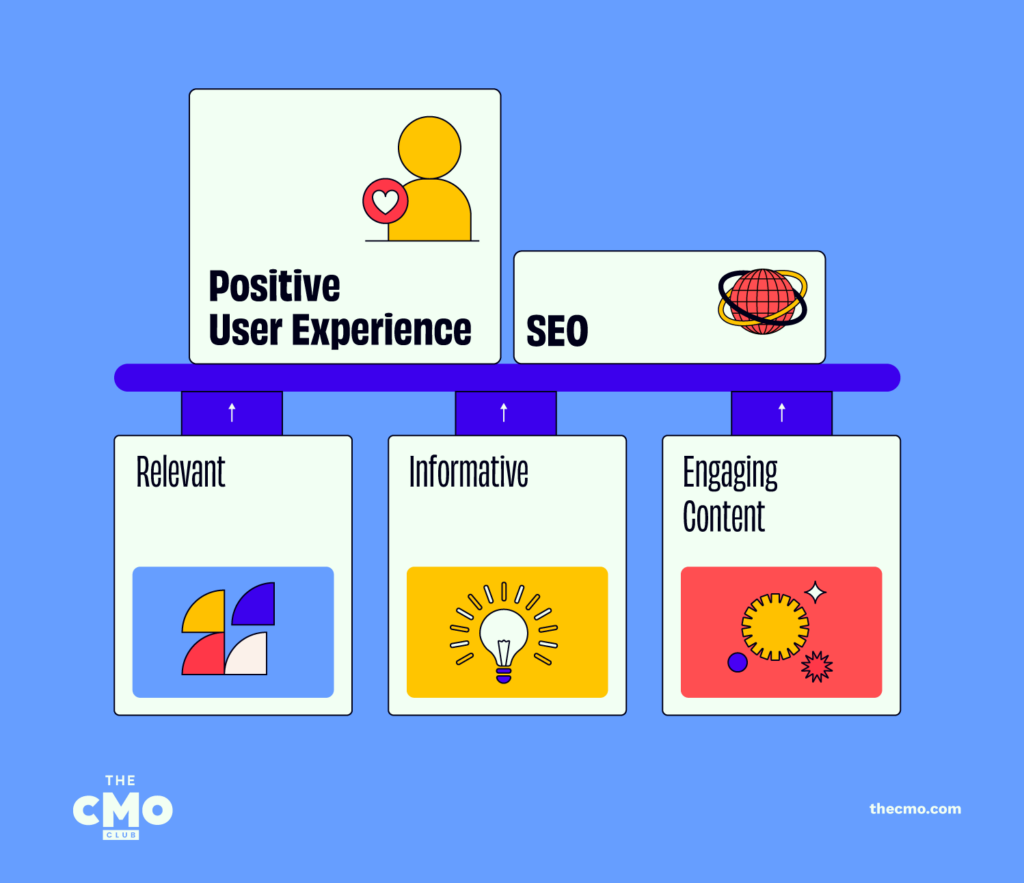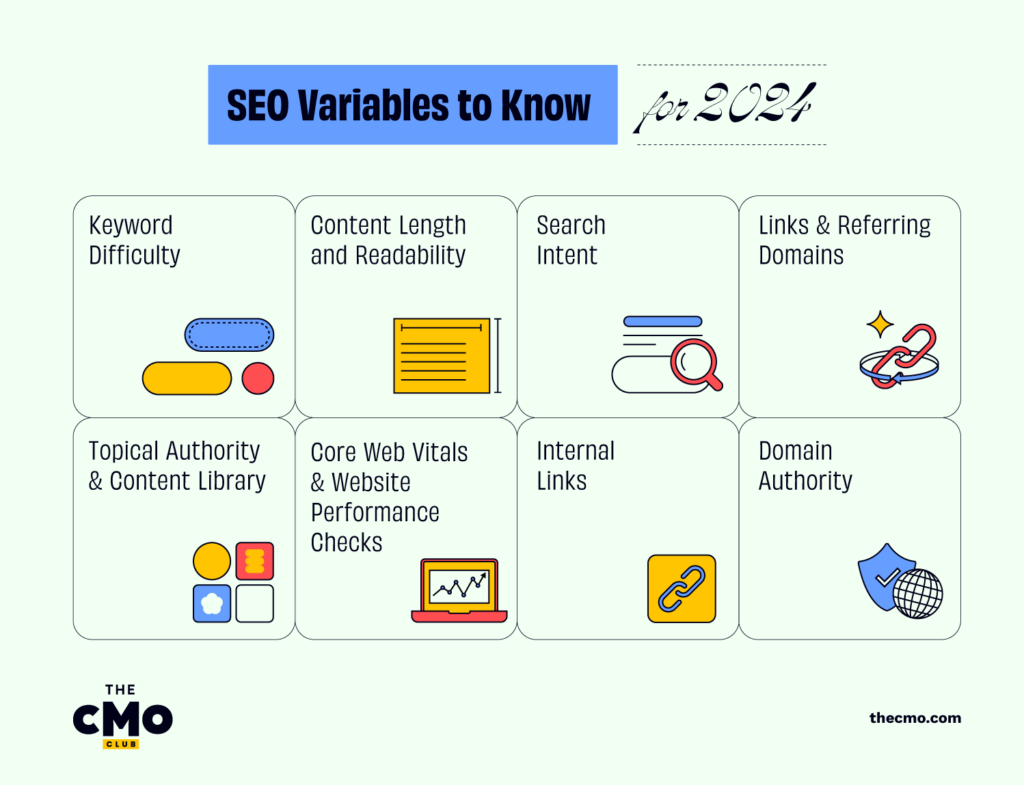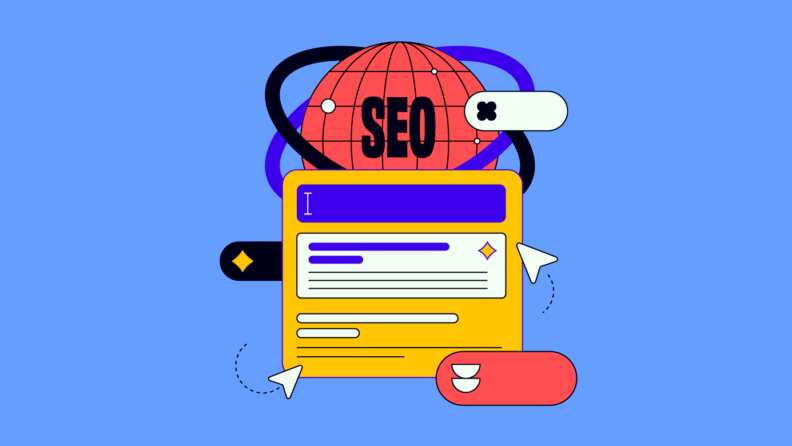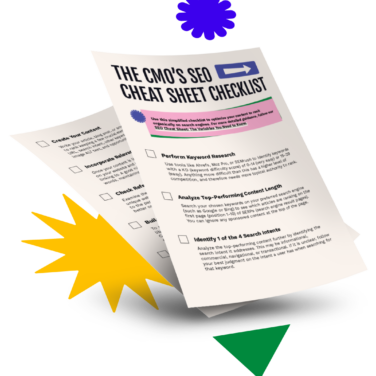Having a great online presence is vital for businesses today. So vital, in fact, that according to a report from Visual Objects, 76% of consumers look for a company’s online presence before visiting in-person.
So, how do you achieve this and lock in that large number of potential customers? It comes down to your search engine optimization (SEO) tactics.
But with the intricate web of factors influencing website SEO, staying informed and in alignment with evolving best practices is increasingly difficult as search engine algorithms change. To streamline this process, I've outlined a guide highlighting the primary SEO ranking variables critical for businesses in 2024.

How Ranking Variables Have Changed in Recent Years
Years ago, keyword stuffing was a common SEO strategy, where websites would overload on target keywords to quickly increase their search engine rankings, and this technique was quite effective at the time.
However, Google's algorithms have significantly advanced, rendering keyword stuffing obsolete. Today, good SEO prioritizes the user experience, valuing content that is not only relevant and informative but also engaging.
Google's algorithm updates have consistently favored the quality of content over the sheer number of keywords, urging website owners to produce material that meets users' needs. This shift has marked an important evolution in SEO strategies, increasing the importance of providing content that's generated with a certain level of subject expertise.

SEO Ranking Variables to Know for 2024
So, with all these algorithm updates, how do you ensure your time and energy are going to have the biggest impact? Allow me to introduce my cheat sheet, where I outline the key SEO variables you should be prioritizing this year:
Keyword Difficulty
Many businesses overlook the importance of keyword difficulty (KD) in their SEO planning, targeting highly competitive keywords beyond their reach. This oversight often leads to inefficient use of resources and lackluster campaign outcomes.
Keyword difficulty measures the challenge of ranking for a particular keyword, taking into account the competition level from other websites. A deeper understanding of this metric can guide you in selecting achievable keywords, greatly improving the effectiveness of your efforts as measured by your SEO reporting tools, helping you to rank faster.
Initially, it can be helpful to identify keywords that have a low keyword difficulty score. This can be viewed in platforms such as Ahrefs, Semrush, or Moz, and as a guide, 0-14 is typically seen as ‘very easy,’ with 15-29 as ‘easy.’ These are the best opportunities to start ranking new web pages on Google if you want to rank as soon as possible with the least amount of effort.
Psst... Get Your Downloadable Checklist
Content Length and Readability
The debate around content length's impact on SEO is ongoing. What we know to be most relevant is that your content needs to comprehensively answer a user's search query.
A practical approach to gauging the appropriate content length is to analyze the average length of first-page search results for your target keyword, which will give you an idea of what the search engine believes adequately addresses user expectations. You can then target your content length to be the same as this average.
In any event, readability should never be compromised for the sake of length. Content that is straightforward and understandable not only increases engagement but is an important variable in your search engine rankings.
Search Intent
Recognizing and addressing a user's search intent is important to SEO. Search intent falls into four categories: informational, commercial, navigational, and transactional.
Recognizing and aligning your content with the specific intent of your target keywords is key. Without this alignment, your site may struggle to achieve its ranking potential, regardless of other SEO efforts.
Below are some tips for optimizing your content to meet the various search intent categories:
- Informational Intent: When someone is on the hunt for answers to particular questions or topics of interest, it's crucial to provide detailed and helpful content. Make sure your content thoroughly answers common questions that are closely linked to the search terms they're using.
- Commercial Intent: When potential customers are on the hunt to buy, they're not just browsing - they're comparing. Your content should showcase why what you offer stands out from the competition. Highlight the advantages, the standout features, and what makes your product or service a cut above the rest.
- Navigational Intent: For visitors who come with a brand already in mind, make their navigation on your site seamless. Your content should feature prominent calls to action, strategic internal links, and clear navigation options that lead them directly to what they're looking for.
- Transactional Intent: When users are set to purchase, your content's role is to facilitate that decision with as little resistance as possible. Showcase your products or services prominently, ensure that calls to action are easy to find, and make the purchasing process straightforward.
It's important to create content that addresses the exact needs of users, whether they're seeking helpful information about a product or service or are ready to make a purchase, ensuring your SEO strategy hits its target.
Links & Referring Domains
Quality inbound links are indispensable for establishing your website's credibility and authority in SEO. But the number of links isn't as important as the link quality, anchor text variation, and overall link diversity you maintain.
Equally crucial but frequently overlooked is the metric used when tracking your competitor's referring domains, which are the unique websites that link to theirs. This can also have an important influence on ranking.
An effective SEO tactic is examining the quality of the referring domains and the specific links pointing to the pages you aim to outrank, then trying to get similar links or better ones to add more credibility to your own site.
As link-building can be a time-consuming process, you can choose to work with an SEO agency to help streamline this process. Most SEO specialists already have pre-established relationships with many reputable organizations and can reduce the time it takes to get these links in place.
Topical Authority & Content Library
To rank for certain keywords, you'll often need a comprehensive library of pages and blog posts that thoroughly address that topic. This is because Google (and other search engines) prioritize sites that demonstrate topical authority and thoroughness. These search engines aim to deliver the most relevant and comprehensive content to their users.
When planning your content strategy, consider what your first-page competitors have in their content libraries. What topics do they cover? How deep do they go into these topics? Use this information as a benchmark and aim to build up your own topical library to match or even surpass theirs.
When engaging with other businesses, you can also apply this same tactic in your SEO. Look at the type of information on their site, the buzzwords that they use, and how they engage their audience. While you wouldn’t necessarily want to compete directly with their ranking placements, this information can be invaluable in helping you create content that aligns with theirs and creates new opportunities for engagement.
Creating content that delivers real value to your readers is paramount. Quality content tells search engines that you're an expert in your industry, and users would value reading it. This approach leads to increased organic traffic and better user engagement on your site.
Core Web Vitals & Website Performance Checks
Core Web Vitals and website performance checks have become increasingly important in SEO. One of the most prominent metrics now is page speed. A fast page loading speed is key to improving the user experience. Slow pages can cause users to abandon your site, increasing bounce rates and lowering your SEO ranking.
As a rule of thumb, a website should load in under 3 seconds. Any slower and you could be risking losing potential customers. To ensure your website performs well according to Google, it's vital to comply with Google's Core Web Vitals standards, prioritizing speed and user experience. These metrics measure the loading performance, interactivity, and visual stability of a page.
Regular audits for broken links and crawl errors are also critical. These issues can hinder the user experience and prevent search engine bots from properly indexing your site.
Ensuring a secure browsing experience through HTTPS is also important. Data protection is a top priority for both users and search engines. Websites that are not secure may be flagged as unsafe, which can deter users and negatively affect your rankings.
Internal Links
Internal links are navigational tools that connect various pages on the same website, and optimizing their configuration can be an effective SEO technique to improve your site's search engine rankings.
The presence of internal links on a page signals to search engines the relative importance of that page, distributing your site's authority across pages and helping in the indexing process. By using internal links to denote the priority of pages within a topic cluster, you can influence their priority in search results.
The effectiveness of internal linking hinges on the relevance of the linked pages, ensuring they add value or further details to the original content that's being viewed. Some of the best SEO tools can help you to identify gaps in your internal links and ways for you to optimize.
Domain Authority
While Domain Authority (DA) isn't a ranking factor used by Google, it's still a useful metric for understanding the overall strength of your domain. Developed by Moz, DA is a score (on a 100-point scale) that predicts how well a website will rank on search engine result pages.
For most new websites, it's common to have a low DA score (anywhere between 1-10). This is because you'll have no backlinks, and the site won't have been around long enough to establish trust with search engines. Top-performing websites typically have a DA score above 50, but this can take several years to achieve.
The important thing to remember is that you shouldn’t focus as much on your DA score as you do to maintain a balanced approach to all of your SEO initiatives. Domain Authority should be used in conjunction with a wider array of metrics to accurately judge your website's condition and progress.
Improving your DA is an ongoing effort that involves publishing content that's higher quality, creating strong inbound link profiles, and maintaining a user-centric site design.
Apply the Right SEO Best Practices
Effective SEO requires an adaptive strategy to see good results with your website's visibility and ranking. However, by prioritizing these ranking variables discussed, you'll pave the way for progressive improvements in your search performance, driving an increase in organic traffic and lead generation.
If you enjoyed this article, let me know on LinkedIn! Also subscribe to The CMO newsletter for more advice and marketing cheat sheets straight to your inbox.


